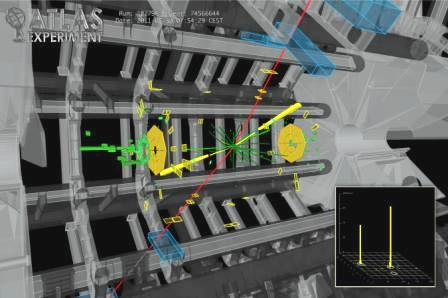In mid-December, as the Large Hadron Collider (LHC) at the European Organization for Nuclear Research (CERN), near Geneva, was winding up for the year, two of its groups, ATLAS and CMS,
made an announcement. After a long search for the Higgs boson, both teams had discovered some anomalies in their data that may be traces of the elusive Higgs. While the results were not proof positive, the scientists involved in the project believe they are a very encouraging sign, raising hopes for more conclusive findings in the 2012 LHC run, set to begin in April.
Members of the Weizmann Institute’s Particle Physics and Astrophysics Department have been prominent participants in ATLAS.
Prof. Giora Mikenberg was the ATLAS Muon Project leader for many years and now heads the Israeli LHC team.
Prof. Ehud Duchovni heads the Weizmann ATLAS group as well as a small group looking for SUSY signals. And
Prof. Eilam Gross is currently an ATLAS Higgs physics group convener. These three have been part of the effort to find the Higgs since 1987.
The Higgs boson is thought to be the particle that gives all the other elementary particles their mass. Predicted by the Standard Model of Particle Physics – a framework for all of the subatomic particles in nature – the Higgs is the one piece of the model that has not yet been proven to exist.
In 2011 the LHC particle accelerator in Geneva collided over 300 trillion (a million million) protons. Seven billion electron volts went into the effort to produce the Higgs boson. But in each collision, other, similar, particles are created. Gross: “There was no way to foresee what we would find. The chances of a collision producing a Higgs boson are so small that only about a hundred are expected to be observed in a year.”
The ATLAS results suggest that there could be a Higgs boson with a mass of around 126 GeV.
Prof. Ehud Duchovni’s research is supported by the Friends of Weizmann Institute in memory of Richard Kronstein; the Nella and Leon Benoziyo Center for High Energy Physics; and the Yeda-Sela Center for Basic Research. Prof. Duchovni is the incumbent of the Professor Wolfgang Gentner Professorial Chair of Nuclear Physics.
Prof. Eilam Gross’s research is supported by the Friends of Weizmann Institute in memory of Richard Kronstein.
Prof. Giora Mikenberg’s research is supported by the Nella and Leon Benoziyo Center for High Energy Physics, which he heads. Prof. Mikenberg is the incumbent of the Lady Davis Professorial Chair of Experimental Physics.
